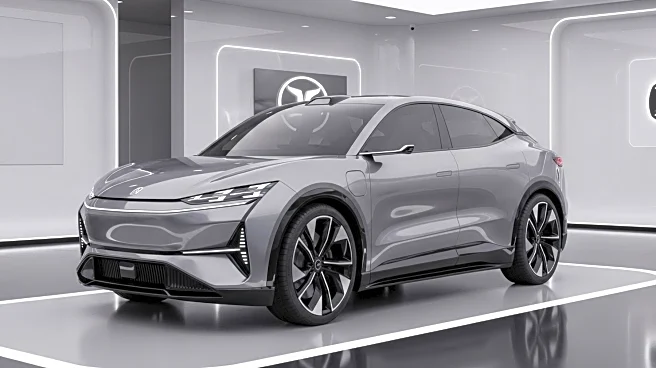What's Happening?
Several automakers are launching high-performance electric SUVs that combine practicality with sporty performance. The Ford Mustang Mach-E GT, Chevrolet Blazer EV SS, Kia EV6 GT, and Hyundai Ioniq 5 N are among the models highlighted for their impressive power and acceleration capabilities. These vehicles offer features such as adaptive suspensions, high-performance brakes, and sportier aesthetics, making them appealing to consumers seeking both utility and excitement in their driving experience. The Ford Mustang Mach-E GT, for instance, delivers 480 horsepower and can accelerate from zero to 60 mph in 3.7 seconds. Similarly, the Chevrolet Blazer EV SS boasts up to 615 horsepower and a 3.4-second 0-60 mph time. Kia's EV6 GT and Hyundai's Ioniq 5 N both offer 641 horsepower and a 3.3-second sprint to 60 mph, with additional features that emulate the sound and shifting experience of traditional gas-powered engines.
Why It's Important?
The introduction of high-performance electric SUVs signifies a shift in the automotive industry towards combining eco-friendly technology with thrilling driving experiences. This trend is likely to attract a broader range of consumers, including those who prioritize both environmental sustainability and performance. The advancements in electric vehicle technology, such as improved acceleration and handling, challenge the traditional notion that electric cars are solely practical and environmentally friendly. As more consumers opt for electric vehicles, automakers are responding by enhancing the appeal of these vehicles through performance upgrades. This could lead to increased competition among manufacturers and further innovation in the electric vehicle market.
What's Next?
As these high-performance electric SUVs enter the market, consumer response and sales figures will likely influence future developments in the automotive industry. Automakers may continue to refine and expand their electric vehicle offerings, potentially leading to more models with similar performance capabilities. Additionally, the success of these vehicles could encourage other manufacturers to invest in electric vehicle technology and performance enhancements. The industry may also see increased collaboration between automakers and technology companies to further improve electric vehicle features and driving experiences.
Beyond the Headlines
The rise of high-performance electric SUVs may also impact the cultural perception of electric vehicles, shifting them from being seen as purely eco-friendly options to desirable, high-performance machines. This could lead to broader acceptance and adoption of electric vehicles across different demographics. Furthermore, the integration of features that mimic traditional gas-powered engines highlights the ongoing transition in the automotive industry, where manufacturers are blending new technologies with familiar driving experiences to appeal to a wider audience.










